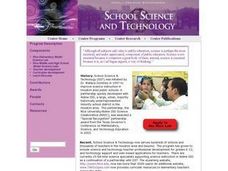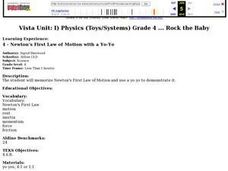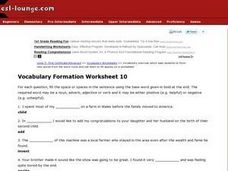Curated OER
Washer Game
Students discover the strengths in their classmates through playing various activities. In the washer game, students pass washers around as they give genuine compliments. Students discuss ways to make compliments meaningful and explore...
Curated OER
Getting it Right! An Investigation of the Pythagorean Theorem
In order to learn about the Pythagorean Theorem, young mathematicians investigate relations and patterns between different sides of a right triangle to look for possible relations among the squared sides. Once they have established the...
Curated OER
Acceleration Science
In collaborative groups, physics learners design and create a web portfolio of internet resoucres explaining poitive and negative acceleration, zero acceleration, and positive and negative velocity. This is a terrific assignment for...
Curated OER
Student-Designed Desks
Students research school room from the past. They create a design for a school desk that is tailored to the specific needs of today's students. They evaluate group work and create a presentation.
Curated OER
Find The Hidden Message: Media Literacy in Primary Grades
Learners practice listening to and reading various types of media and text. In groups, learners use video, newspapers, magazines, and more to compare and contrast different types of information. They identify the differences between fact...
Curated OER
Classroom Aquaponics: Exploring Nitrogen Cycling in a Closed System
Learners investigate nutrient cycling in a simplified desktop ecosystem involving aquarium and hydro-ponically grown plants. They set up an aquarium with 10 gallons of water at least a week before the lab is planned and place...
Curated OER
Don't Bet The House On It!
Great real-world math application! Have the class compare and contrast their estimated home price and income data with actual data. In groups, they participate in simulations to discover how the housing market and mortgages operate....
Curated OER
Newton's First Law of Motion with a Glider
Third graders examine, analyze, study and memorize Newton's First Law of Motion utilizing a glider to demonstrate the process. They state, sing, draw or enact an example/illustration of Newton's First Law of Motion in front of their...
Curated OER
Newton's First Law of Motion with a Yo-Yo
Fourth graders are introduced to, summarize, analyze and memorize Newton's First Law of Motion and experiment demonstrating the theory with a yo-yo. They state, sing, draw, or enact Newton's First Law of Motion several times and with...
Curated OER
Cup Capacity Tool: Measuring Cup
Students examine containers and their capacity. They fill a one-cup measuring cup with water and pour cups of water into other containers. Through observation, students discover how many cups make a pint, and how many teaspoons make a...
Curated OER
Science: The States of Matter
Third graders conduct experiments in matter to create chemical changes resulting in gases. By mixing solids and liquids, they create a chemical reaction and capture the gas in balloons. After observing the balloons fill with carbon...
Curated OER
Volcanoes!: Forecasting the Path of Mudflows
Students construct a mockup of a volcano by crumbling up newspapers and piling them into the shape of a volcano. They place a tarp over the newspapers making sure the tarp is large enough to simulate a flat area at the volcano's base....
Curated OER
Quiet on the Set!
In pairs learners perform a silent skit portraying relationships between two known characters from a popular book or a play for their classmates. Next, the class will read and discuss a NYTimes article about a film school in the Bronx...
Curated OER
Gold Fever
In this reading worksheet, young scholars answer 10 multiple-choice questions about the book. For example, "Why did John Sutter ask James Marshall to keep the gold a secret?"
Curated OER
Vocabulary Formation Worksheet 10
In this vocabulary formation worksheet, 5th graders read eight sentences and fill in the blanks in each sentence with an appropriate form of the base word in bold found at the end of each sentence.
Curated OER
Reading: Personality-Type Questionnaire
While this activity is a personality questionnaire, it could be used for a variety of purposes. High school students might use this activity as a way to spur discussion about individual traits. The 20-question activity contains scenarios...

















